Professional Courses
Industry-relevant training in Business, Technology, and Design
Categories
Interactive Games
Fun games to boost memory, math, typing, and English skills
Typing
Memory
Math
English Adventures
Knowledge
Is NIOS and CBSE Syllabus Same? Key Differences Explained
Is NIOS and CBSE Syllabus Same? Key Differences Explained
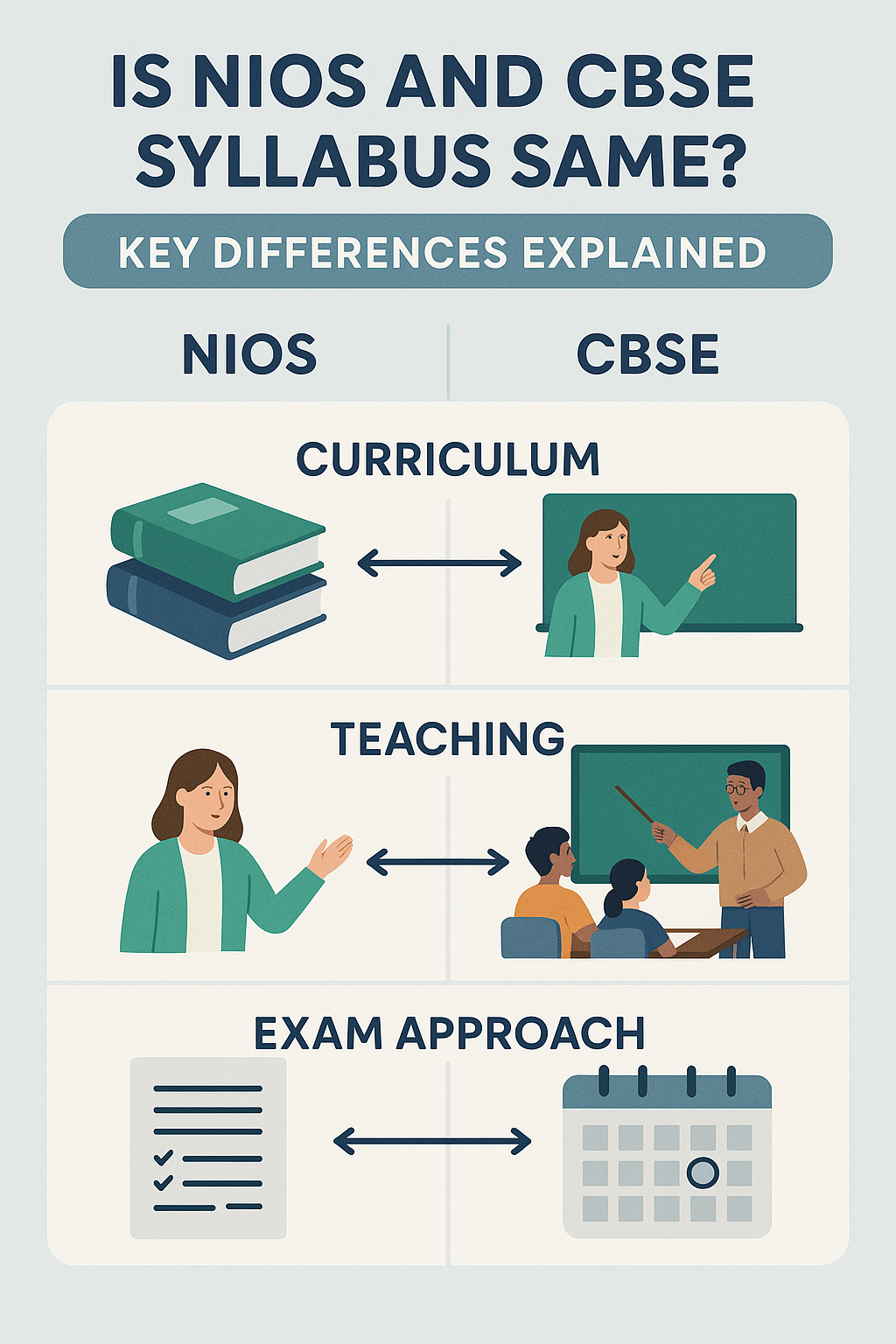
When parents and students in India start exploring school options, two names often come up, CBSE and NIOS. While CBSE (Central Board of Secondary Education) is one of the most widely recognized boards in India, NIOS (National Institute of Open Schooling) is equally important for students who need a flexible learning path. But a common question arises: is the NIOS and CBSE syllabus the same?
The short answer is no. The two boards follow different structures, objectives, and exam philosophies. However, both are recognized by the Government of India, and both prepare students for higher studies, entrance exams, and careers. To understand the differences fully, let’s break down the curriculum, teaching methodology, and student outcomes in both systems.
For a foundation, you can also explore:
Understanding CBSE
The Central Board of Secondary Education (CBSE) is India’s most prominent school board, with thousands of affiliated schools across the country and abroad. The CBSE follows a structured, uniform curriculum that emphasises core subjects, including Science, Mathematics, Social Studies, and Languages. It is also closely tied to NCERT textbooks, which form the backbone of its syllabus.
The CBSE syllabus is well known for aligning with national-level entrance exams like JEE and NEET. This makes CBSE a preferred choice for students aspiring for engineering and medical careers. You can read more in detail about What is CBSE in resources section.
Platforms like AllRounder.ai offer CBSE-aligned courses for Class 8, Class 9, Class 10, Class 11, and Class 12, helping students strengthen their grasp on the curriculum.
Understanding NIOS
The National Institute of Open Schooling (NIOS) is an autonomous organization under the Ministry of Education, Government of India. It was designed to provide flexible education to students who cannot follow the conventional school system.
NIOS allows learners to:
- Choose subjects as per interest.
- Study at their own pace.
- Appear for exams twice a year with flexibility in timing.
The syllabus covers similar subjects to CBSE but is presented in a simplified manner to make learning more accessible for students from varied backgrounds. NIOS caters especially to working students, athletes, differently-abled learners, or those who require an alternative to regular schooling.
Is the Syllabus the Same?
Here is where the key difference lies. While both CBSE and NIOS are recognized boards, their syllabi are not identical.
- CBSE: Rigidly follows NCERT textbooks and a structured curriculum. The aim is to prepare students for higher education and competitive exams.
- NIOS: Offers a more flexible curriculum, with simpler content and the option to customize subjects. It focuses more on inclusivity and providing education opportunities to those who may not thrive in traditional schools.
For instance, CBSE Class 10 Science emphasizes detailed theoretical understanding, while NIOS simplifies concepts to ensure accessibility. CBSE Class 12 Mathematics prepares students rigorously for JEE-level questions, while NIOS Mathematics focuses more on applicability and basic problem-solving.
Curriculum Philosophy: Depth vs Accessibility
The difference between the boards can be summarized in terms of depth and accessibility.
- CBSE dives deep into every subject, with a focus on building strong academic foundations. It expects students to follow a disciplined study schedule, solve NCERT examples, and prepare for board exams that demand precision.
- NIOS, on the other hand, prioritizes accessibility. It ensures that even if a student has limited study time or resources, they can still grasp essential concepts and pass their board exams successfully.
Examination Approach
Another key difference lies in the exam pattern.
- CBSE Exams: Structured, detailed, and often competency-based. Questions can include case studies, assertion-reasoning, and application-based scenarios. Success requires thorough knowledge of NCERT and regular practice tests.
- NIOS Exams: Comparatively simpler and more direct. The goal is inclusivity, ensuring that students of diverse backgrounds can complete their education successfully.
This doesn’t mean NIOS exams are inferior, they are simply designed with a different set of learners in mind.
Recognition and Future Prospects
Both CBSE and NIOS are recognized by the Government of India and accepted for:
- Admission into colleges and universities.
- Eligibility for competitive exams like JEE, NEET, and UPSC.
- Employment in government and private sectors.
However, because CBSE is more aligned with JEE/NEET preparation, students from CBSE often find it easier to adapt to those competitive environments. That being said, NIOS students can and do succeed in these exams, but they often supplement their preparation with additional coaching.
For example, AllRounder.ai practice tests provide students from both boards with exposure to competitive exam patterns, bridging the gap effectively.
Student Experience in CBSE vs NIOS
Students in CBSE schools usually experience a more structured routine like regular classes, assignments, periodic tests, and a clearly defined calendar. This structure benefits students who thrive on discipline and consistency.
Students in NIOS enjoy flexibility as they can pace themselves, pursue sports, arts, or even part-time jobs, and still complete their education. The challenge here is self-discipline; since there’s less structure, students must take responsibility for their learning.
Interactive learning resources, such as AllRounder.ai games, are helpful in both systems, making concepts easier to absorb, whether you are on a strict CBSE timetable or a flexible NIOS routine.
Which One Should You Choose?
The choice between CBSE and NIOS depends on your goals and personal situation.
Choose CBSE if:
- You are aiming for JEE, NEET, or other competitive exams.
- You prefer structured learning with regular assessments.
- You want a strong foundation for academic rigor.
Choose NIOS if:
- You need flexibility due to health, work, or personal reasons.
- You prefer learning at your own pace.
- You want access to education outside the traditional system.
If you’re still unsure, comparing CBSE vs ICSE for NEET/JEE can also give perspective on how different boards impact competitive preparation.
Tools That Support Both Boards
Whether you’re in CBSE or NIOS, the tools you use can make all the difference. Platforms like AllRounder.ai offer resources for every learning style:
- CBSE courses for structured NCERT alignment.
- ICSE courses and IB courses for comparison.
- Grade-specific support from Class 8 to Class 12.
- Practice tests to simulate exam environments.
- Games for stress-free revision.
This hybrid approach ensures that, regardless of the board, students are exam-ready.
Final Thoughts
So, is the NIOS and CBSE syllabus the same? No, they are not identical. While both boards aim to provide quality education and are equally recognized, their philosophies, depth of content, and exam approaches differ. CBSE is structured, rigorous, and deeply aligned with competitive exams. NIOS is flexible, inclusive, and designed to make education accessible for all.
Ultimately, the “better” board depends on your circumstances and aspirations. What matters most is how you use the opportunities each system provides. With the right study resources, whether through traditional classes or online platforms like AllRounder.ai, success is within reach for students of both CBSE and NIOS.
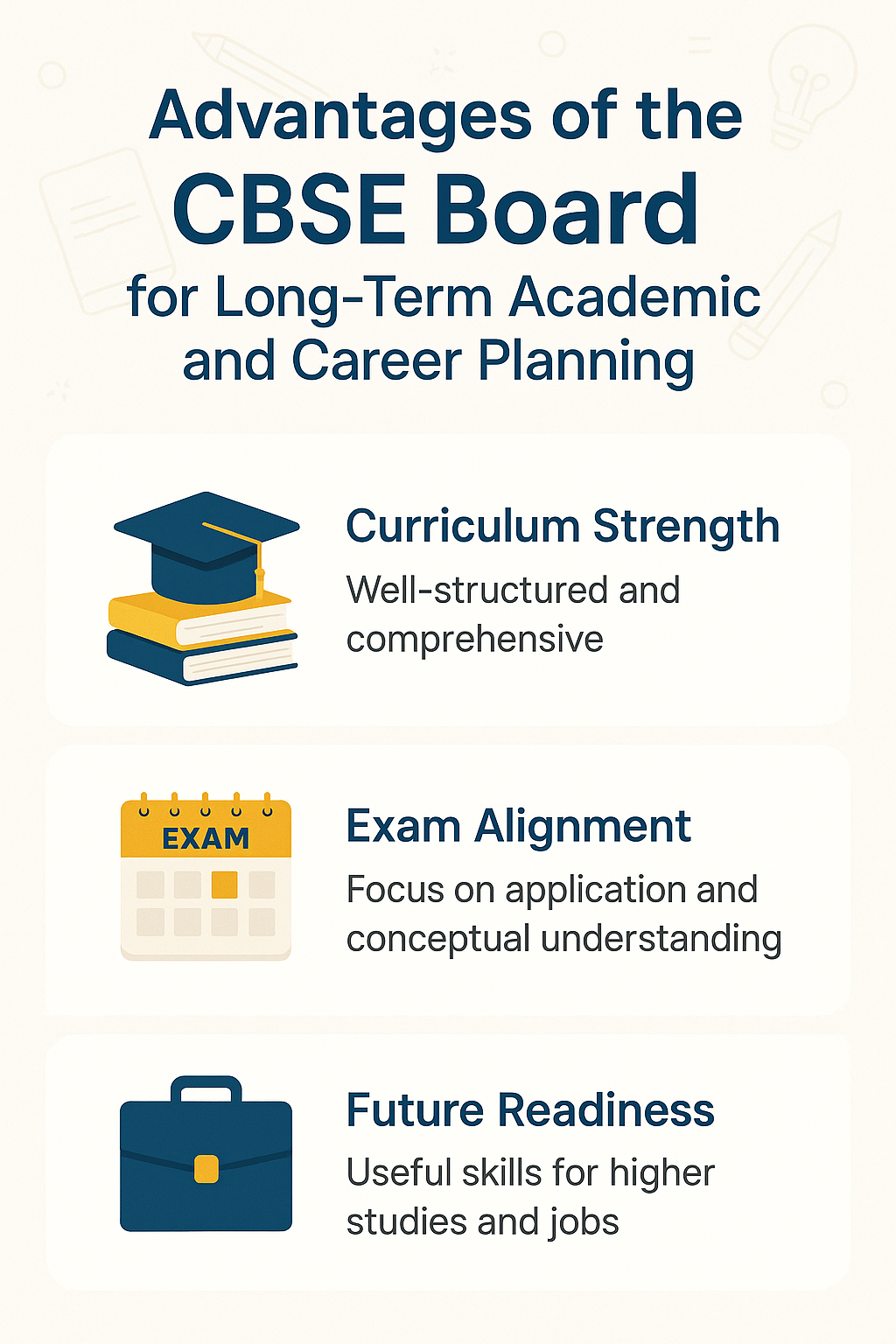
Discover the advantages of the CBSE board for long-term academic and career planning, including curriculum strength,...
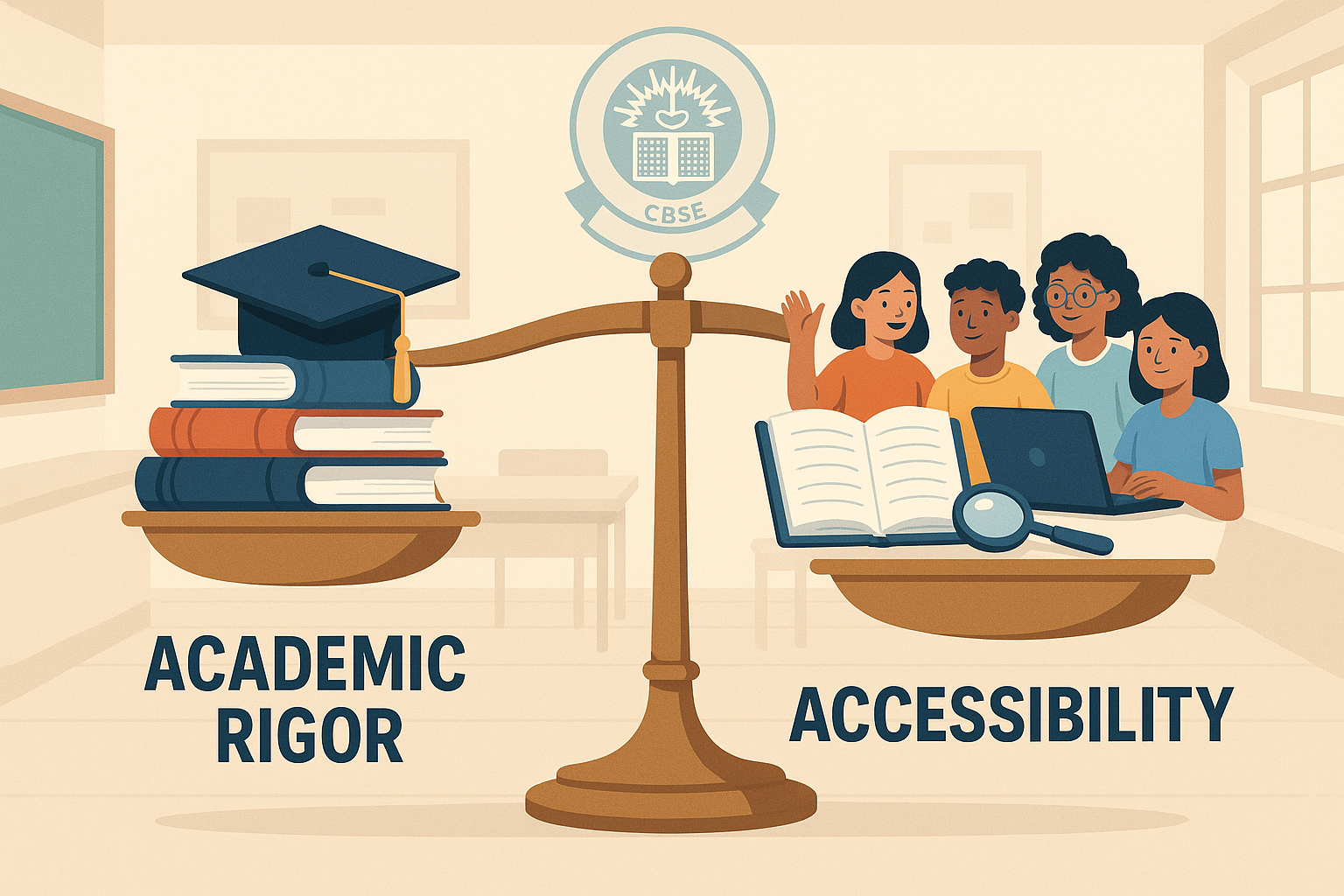
Explore how the CBSE board balances academic rigor and accessibility through its curriculum, syllabus, exams, and...
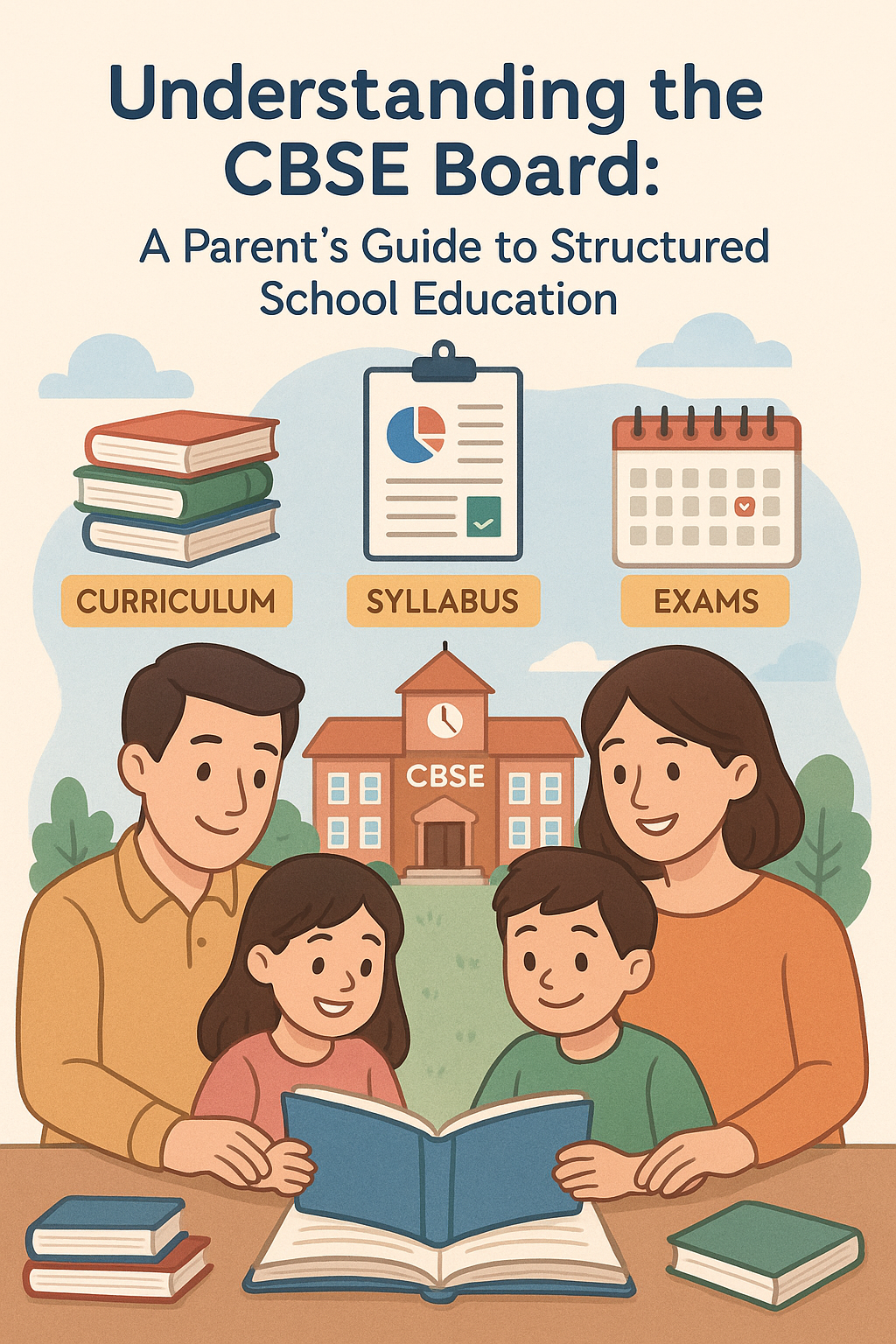
A complete parent’s guide to understanding the CBSE board, its curriculum, syllabus, advantages, exam structure, and...
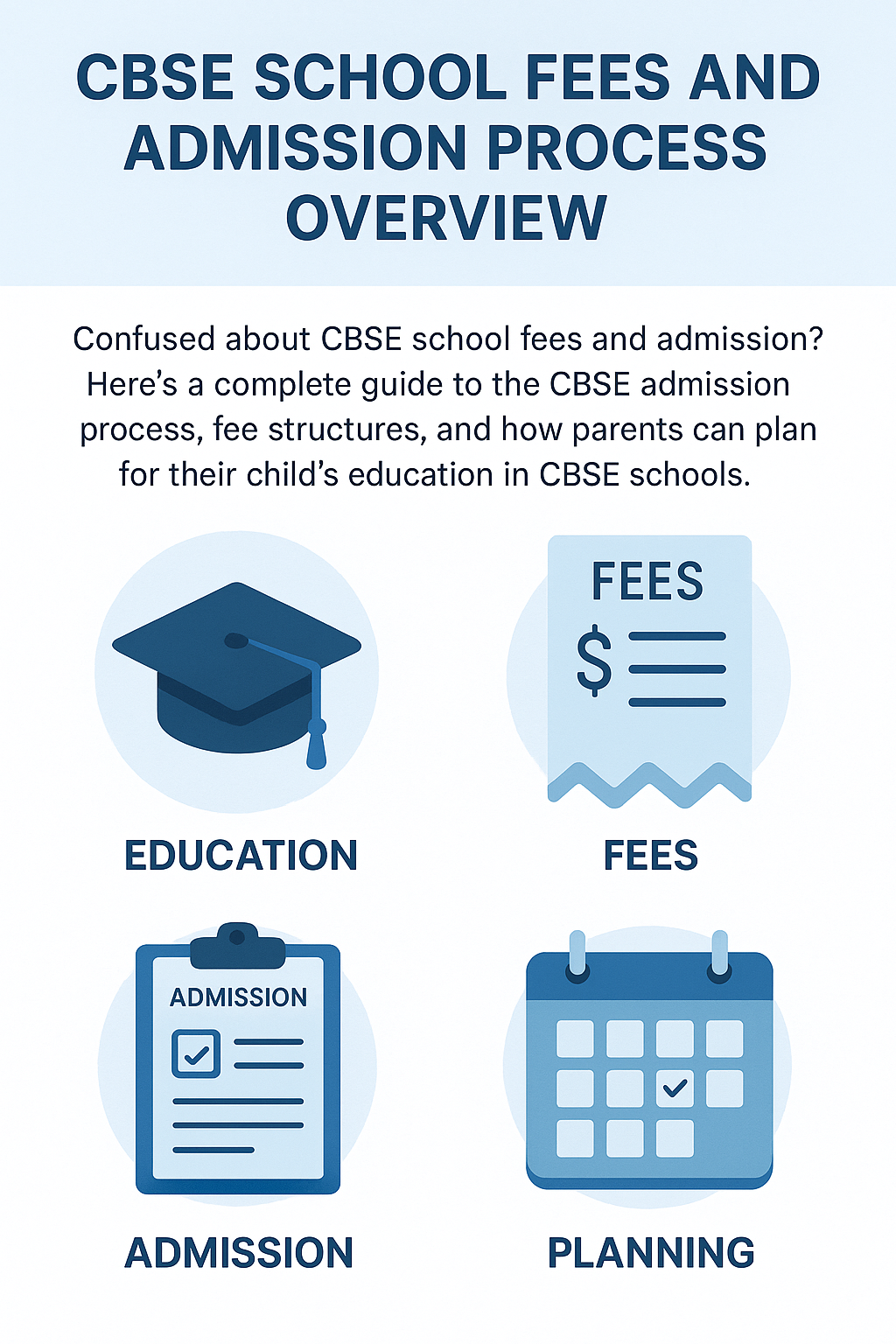
Confused about CBSE school fees and admission? Here’s a complete guide to the CBSE admission process, fee...

Is NIOS and CBSE syllabus same? Discover the key differences in curriculum, teaching, and exam approach. Learn how...

CBSE Holiday List 2025: Explore the official school calendar, national & regional holidays, summer & winter...
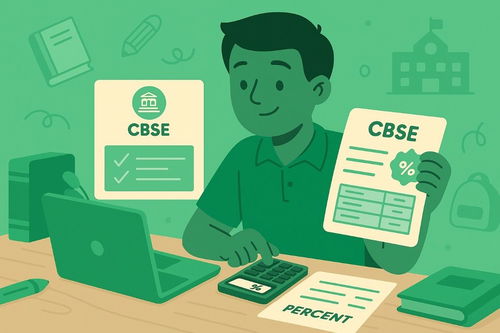
Learn how to calculate your CBSE 12th percentage from your marksheet using the official formula with a simple...

Confused about RT, COMP, and ER on your CBSE marksheet? Learn their meanings, reasons, and what steps you should...
Learn everything about the CTET exam for aspiring CBSE school teachers, including eligibility, syllabus, preparation...

Looking to apply for the CBSE Single Girl Child Scholarship Scheme? Learn eligibility, documents, application steps,...

Discover everything parents and students need to know about the CBSE Class 9 registration process, including...

Learn everything about the CBSE private candidate application process and rules. Understand eligibility,...

Confused about the CBSE answer key? This guide explains how to access it, interpret it, and use it to analyse your...

Confused about how CBSE re-evaluation or re-checking works? This guide explains eligibility, steps, fees, deadlines,...

Discover how to use the CBSE Academics website to access important resources like curriculum, sample papers, and...
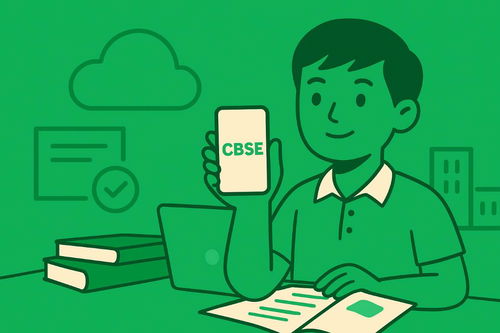
Learn how to easily access your CBSE marksheets and certificates using DigiLocker. This step-by-step guide helps...
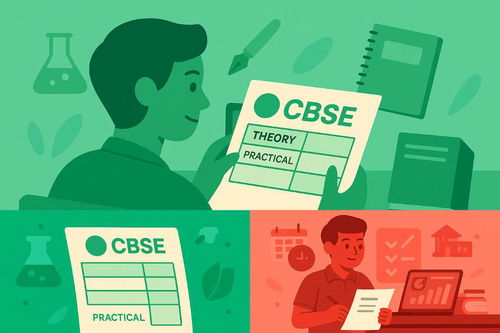
Confused about CBSE passing marks for theory and practical exams? This guide explains the minimum marks needed to...

Learn how the CBSE Open Book Exam will be implemented for Class 9 and Class 11 students. Understand the benefits,...
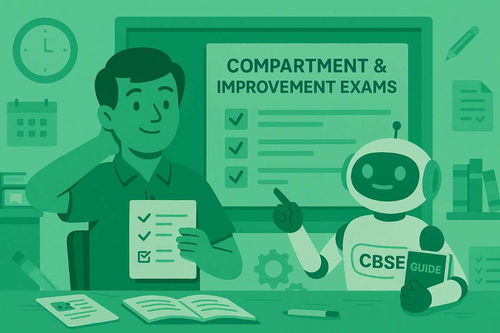
Confused about the CBSE compartment and improvement exam process? This complete guide explains eligibility, how to...
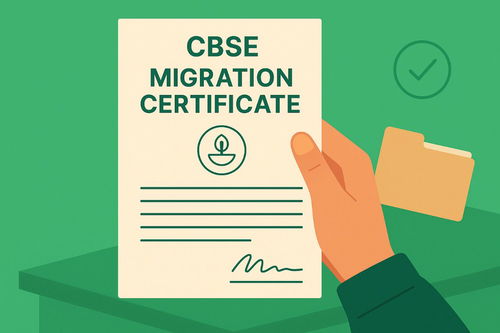
Learn how to obtain your CBSE Migration Certificate after Class 10 or Class 12. This detailed guide walks you...

Confused about your CBSE Admit Card? This easy step-by-step guide explains how to download it, what details to...

Discover what CBSE competency-based questions are and learn how to answer them expertly to you ace your exams.

Boost your Class 10 CBSE board prep with sample papers. Learn how to revise smartly, manage time, and score higher...

Learn how to score high in the CBSE curriculum with a subject-by-subject guide, expert tips, and AllRounder.ai tools...

Compare CBSE vs ICSE to choose the best board for your child. Understand syllabus, teaching style, exam prep, fees, and more.

Understand the latest CBSE marking scheme and question paper pattern. Learn about competency-based questions,...

Want to score above 95% in your CBSE Class 10 boards? Our strategy guide breaks down topper study plans to revision...

Compare CBSE vs ICSE to find the best board for NEET and JEE preparation. Understand syllabus match, exam formats,...

Treat your CBSE Class 12 exams using an athlete's approach to help you train, strategize, and perform your best on exam day.

Get ready for your CBSE Class 10 board exams with our survival kit. Find the official syllabus, a smart study...

Learn how to verify CBSE marksheets, certificates, and results online. Step-by-step guide for students and parents...

Master CBSE with top-rated tools, study planners, and expert online help. Perfect guide for Class 9–12 students...

Learn about CBSE – its full form, history, objectives, and structure. Get insights into CBSE’s role in Indian education.
Resources
-
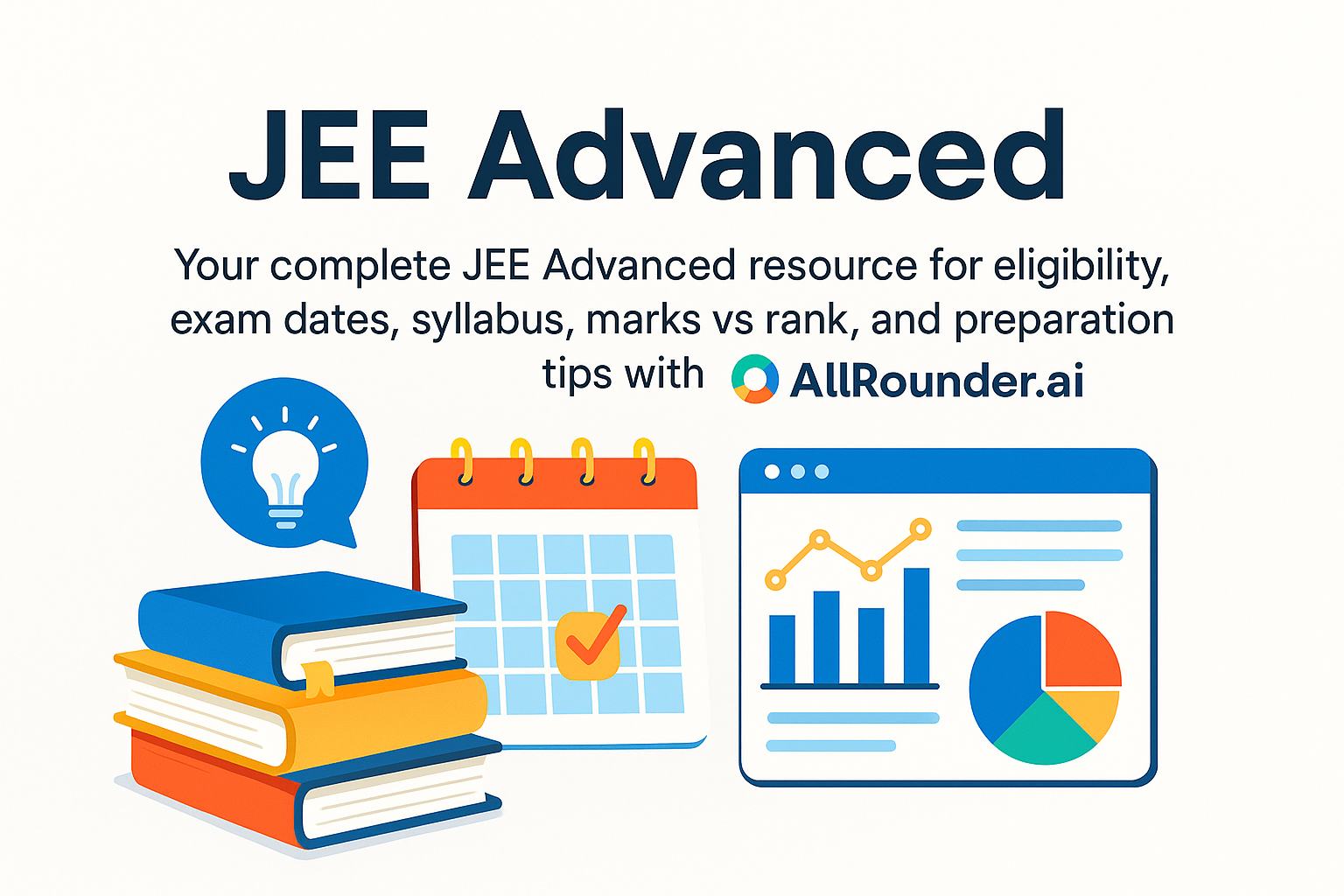
Your complete JEE Advanced resource for eligibility, exam dates, syllabus, marks vs rank, and...
-
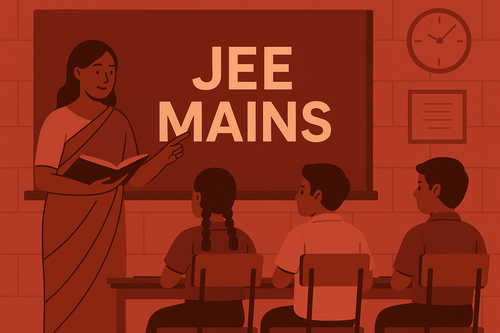
Understand the entire JEE Main process, from application and eligibility rules to the exam...
-

Explore the IB Board – a global curriculum emphasizing holistic, student-centered learning...
-

Learn about CBSE – India’s national school board offering a standardized curriculum, NCERT...
-

Explore everything about the ICSE board – its curriculum, subjects, exam format, and academic...

